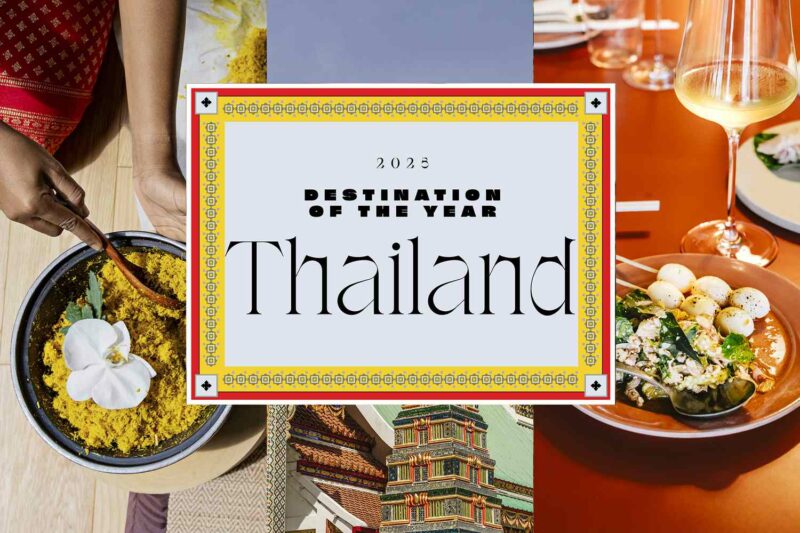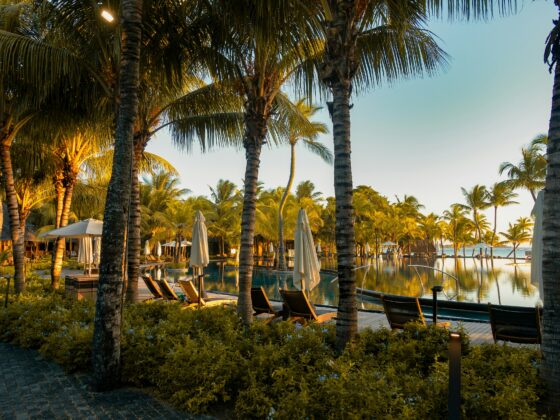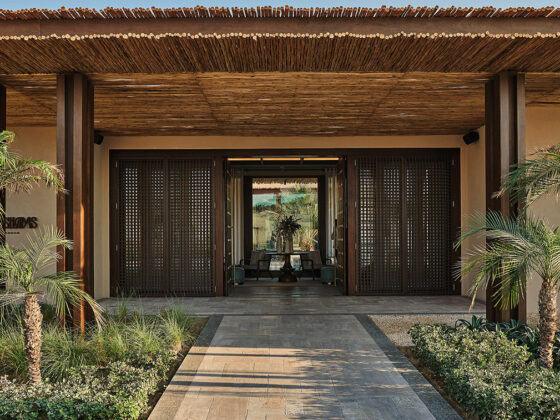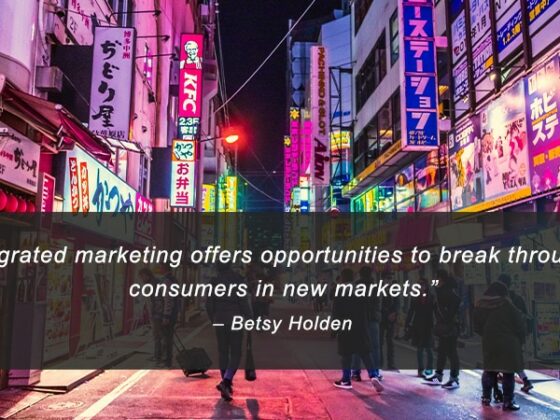Josiah:
If you’re like me, you’ve loved seeing historic hotels restored and reinterpreted as modern hospitality concepts. But what actually goes into this? Sherri Villanueva is the founder and managing partner of Acme Hospitality, which has three historic hotel properties – two in California’s Gold Country and one in Palm Springs. In this episode, you’ll learn about the opportunity with historic properties, how to learn about the history of a place, and how to reinterpret properties to be both authentic and timeless.
Josiah: Let’s talk about lodging. How did you get into lodging? This is a significant departure from the restaurant business.
Sherry:
This is back to my rookie story, my rookie origin story, and again, maybe the naivete that goes along with being a rookie. Brian Kelly discovered these properties as interesting real estate opportunities. He fell in love with the properties themselves and the communities that they were located in. They are rich with history, particularly California, specifically California and uniquely California history, which is so fun when you really dive into what that means. And I think it was the buildings themselves that spoke to him. The diversity of the area that they were physically located in and the possibility that they had. They were in dire need of investment and improvement, and so I think he saw that opportunity as well and the possibility of what they could be. And so he purchased the properties and then came to me and said what can we do? How can we dig in and create the kind of Acme magic around what these properties are? And then that’s when our team kind of dug in and got to work.
Josiah:
Well, I want to get into that, but you also you mentioned something about it being uniquely California. Yeah, what is that to you?
Sherry:
Well, California is very diverse, which I love. I’ve spent most of my life in California, both in Northern California and in Southern California and Central California, and it’s fascinating. It’s just a fascinating community, culture, and lifestyle. The geography is so diverse and when I look at Santa Barbara and its connection to history and what that looked like with the early settling of California, it’s the reason we were attracted to San Juan Capistrano and because of their part in early California history and settlers coming into that area and Spanish and Mexican influences and what rancheros were doing in the early days of California and all the way as the missionaries came up the coast of California and places like Santa Barbara being founded and rooted in that Spanish culture. And we love that. We love telling the story of California, the story of California in Northern California. Well, northern California is again its own diverse You’re going from San Francisco all the way up to the border wildly different. And these hotels are located in what they call Gold Country and they were built in the 1850s and they were part of sort of the boom town of the Gold Rush in the Sierra Foothills, which has really interesting and fascinating sides of its history and some dark sides of its history too, and the impact that it had on the local community, particularly the local Native Americans who were there. But it’s important to study and understand where they fit in the story of California because it was such a big thing at the time that it was happening. And when you look at the properties they’re five miles apart and worlds away. They’re wildly different, very, very separate and distinct in the culture of the communities that they are located in and even the physical properties themselves, but both a part of that chapter of California history.
Josiah:
What initially attracted you to these historic properties, versus just doing a brand new build?
Sherry:
I think we love storytelling. I would say that’s one of the things we get the most joy out of, and because we love storytelling, we love history and we love historic properties. Currently, all of our restaurants and hotels are located in historic properties. Some of our new developments are in new buildings that we are building from scratch, but they’re rooted in communities with long, deep histories to tell, and so we love that aspect of it. And I think up north in Nevada County, the stories are endless, starting with the California Gold Rush, and then you have 165 years of storytelling and five US presidents staying in our hotels and Mark Twain living in one of them, and the layers upon layers of guests that we’ve had coming in and out of the buildings. There’s even storytelling around paranormal activity, and PG&E was founded in one of our hotels and just there’s no end to the important parts of history and human experience that have passed through those doors, and so we just love that. I think it’s so fun.
Josiah:
What is your process for learning that history and as you kind of think about reimagining what’s the next iteration of this property starts with a lot of history. It sounds like a lot of learning, but can you walk us through the process of how you begin that?
Sherry:
You begin it in sort of traditional ways, you do a Google search, but then there’s generally a historical society that’s somewhere nearby and you go and visit them and you meet the local historian and you take her out to lunch or you take him to coffee and you ask questions and you interview local families. At our hotels up north, both properties are covered with beautiful old photography of families and people who were living in the area back from the 1850s on, and many of them were donated by local families living in the communities that were very proud of their families being there for three, four, five, six generations.
Josiah:
Did you collect those, because that’s incredible.
Sherry:
It’s the same process of when you’re writing a business plan. You just become a relentless questioner and asking questions and following leads and sitting at coffee shops, talking to people and, oh gosh, you’re a third-generation person. Wow, would it be okay if I talked to your grandparents and understand their history? One of the highlights of my career was when we opened the National Exchange Hotel in Nevada City. We got a call from someone. His name is Wally and he was celebrating his 70th wedding anniversary 70 years. He called and said that he had been married at the National Exchange Hotel and would it be okay if he and his wife could come by for a glass of champagne. And it was about a week before we were opened, so we weren’t quite ready yet. And we said, of course, absolutely, you can come by. And we scrambled, we ran all around, we’ve got a bunch of champagne, we made big snacks and cheeseboards and he brought his family four generations of his family to come and we had a big party for them. And it was just such an honor that to be able to. When you think about four generations of a family celebrating birthdays, anniversaries, high school graduations, baptisms, you just name the occasion they celebrated at that hotel and for them to all come back and celebrate these two extraordinary individuals who’ve now been married for 73 years. I think was this year. Of course, they came back this year and celebrated again, which we loved. And so that’s how you learn you talk to those folks, you ask them for their stories, you write them down, you dig into historical societies, you go through thousands of hours of looking at photographs, sometimes on microfeet, not even digitally scanned, yet it’s like a discovery journey that you just one question leads to the next person leads, to the next idea, and you build a story around it. And that’s been probably the most fun that we have with all of our properties.
Josiah:
So you run a business that is around California, right, a lot of different locations. You have an incredible team, but I’m curious for you personally, through the launch of this project, were you spending some time up there as part of this process?
Sherry:
I absolutely was, and that was a very difficult part of the journey. We purchased the hotels in 2018, got really going on construction in 2019. They were very complex. You’re dealing with 165-year-old buildings. One of them is a California historic landmark. One of them is a national historic landmark. You’ve got layers of regulations, planning commissions, city council approvals just lots and lots of red tape to go through to try and create a building that is safe, it’s to current building codes, it’s ADA accessible, it’s beautiful. In one of the hotels in particular, I think there were nine layers of wallpaper that we were peeling and peeling, and peeling, and so that in and of itself was extremely difficult the process in both of those properties. And then COVID hit. And when COVID hit, actually it was interesting because my husband and I decided to rent a house up in Nevada City and we said things in Santa Barbara are super stable. We have an incredible team running the show. I had been commuting back and forth on a very small regional airline called Contour Airlines. I could fly to Sacramento and then get there relatively easy, and then we said let’s rent a house in Nevada City. It’ll be a fun adventure, we’ll rent it for six or nine months and we’ll kind of move up there and then I can commute back to Santa Barbara when I need to be here and really excited to dig into the community and get to know the place. And then COVID hit. So we had rented a house and it was this little cabin out in the woods and everything changed because I was needed so desperately in Santa Barbara. I had a very good team also in Nevada City, grass Valley, who were managing the construction process, but I was also needed there. And then all flights were canceled and there was no transportation between the two. So I ended up commuting seven hours each way every week back and forth for a year. Oh my gosh, it was really difficult and the stress and strain of it trying to keep construction teams moving forward in masks and all the requirements that we had to comply with, while also running back here trying to do things like set up a grocery store. And then the whole year was we’re open, we’re closed, we’re partially open, we’re partially closed. We’ve got all these new sanitation regulations to comply with. I mean it was a very difficult time but we were on a deadline. Again. It was a very expensive process to renovate the hotels. We needed to keep pushing them forward to try to get them done. When you’re on a complicated construction site like that, there are trades coming in after trades, so keeping on the schedule is very critical. So we just kept pushing, but it was a challenging time, to say the least.
Josiah:
I can only imagine Now that you’re on the other side of that, I wonder. I love the storytelling element, the place-making. Is there anything about the design, construction and renovation of these properties that you’re especially proud of in making them what they are today?
Sherry:
I’m very proud of all of our properties and we’ve had an incredible opportunity to work with a group of extraordinary designers. There’s a gentleman by the name of Doug Washington who’s done all the design in our Santa Barbara properties and we have a tremendous collaboration. He’s been a very valuable resource for our team and it’s been really fun to work with him. When we went up north, we brought Doug with us he’s actually located in the Bay Area and we added to his team two other designers one of women by the name of Bree Ingram, who is a local resident, a very talented designer, also living in Nevada City, and then a woman named Ann Lesbronce who we brought in, who had been working with our team in Palm Springs, and she came in really as the kind of project manager and the three of them became a design team and that was the first time I’d ever worked on a team which brought its own unique benefits and, I think, collaborations. We were the lucky beneficiaries of being able to have three heads instead of one. It brings in its own set of challenges also, which, luckily, we were able to work through as again staying as a good team, but I think the result was just this really beautiful property. I think the thing that I’m the most proud of was what we set out to do, which was create a design that was timeless, that was sort of rooted in the 1850s but had more of a timeless experience, so that, one, we didn’t look like a museum that’s not a comfortable place to stay. One, we didn’t look like someone in the grandmother’s attic. And, two, we really could create those modern amenities that traveling guests are looking for today things like internet access but really do it in a way where we could evoke that sense of history and that sense of storytelling for people who came to the hotels and stayed. It was one of the most fun branding processes that we’ve been through was the Hotels Up North, and we created these identities for each property. When you’re doing two properties side by side, it’s a different experience than if you’re doing one that’s isolated on its own, like our property in Palm Springs. And so because these two properties are next door well, they’re five miles, so almost next door to each other we needed them to relate to one another, but we wanted them to be wildly different from each other, and we do that in Santa Barbara, too, because we’re the proximity of where our restaurants are located. We want them all to be very special and very unique and very distinct in their offerings, and so that takes a lot of effort and work, and the hotels were no different in that way. And so we created these personalities. We created this kind of rugged frontiersmen and a more masculine approach at the Holbrook, and you can see it through the design there’s taxidermy everywhere and leather and steel and wood. And then we created this beautiful feminine character at the National. She was beautiful and feminine but she was very tough, like you did not want to cross her, and you would probably see her in the bar drinking whiskey, neat with a knife in her garter. And so that idea of who those two characters were inspired the design and became our kind of design filter. So everything we did said does it match the personality of those two distinct characters?
Josiah:
This was actually one of the things that, as I was preparing for this, do that to me and I’m going to link to each of the websites and the show notes because I think from a graphic branding identity it was very distinct, and then I also want people to look at photos of these properties. It’s really cool to see that. One thing that I am curious about is some of the connections between things that you learned in the restaurant business. You talked about kind of working with Doug across these. There’s this historic connection between your restaurant business and your lodging business, but is there anything else you’ve learned in the restaurant business that’s informed how you’re thinking about lodging now?
Sherry:
There’s lots we’ve learned in the restaurant business. As I think about lodging, I think, being a rookie it has really informed so much of my experience. I went into the lodging business with more naivete and very much of a rookie perspective In my head. I thought gosh, we’re restaurant people. Restaurant people are bad ass. We can do anything. It’s so hard to run restaurants that if we can run restaurants, we can run a hotel. It’s just like a restaurant with a couple of rooms upstairs. How hard can it be? Again that, how hard can it be? Comment my sister is a very accomplished hotelier. We should have been in the business for about 40 years. We often share stories, we share ideas. She’s been just a tremendous mentor and collaborator for me. She, I think, was for sure laughing at me. I’m like I can do this. When we actually got into it, you quickly discover that they’re completely different, totally and completely different. What are some of the biggest?
Josiah:
things that stand out to you.
Sherry:
Well, the guest experience is probably the biggest thing In our hotels. They have large restaurants and bars. We have an advantage there. We know how to do that part of it. The difference is that the guest experience in a restaurant might be two or three hours. You have this contained opportunity to take care of your guests, connect with your guests and really create an experience that they’re going to love. At the hotel it’s a 24-7 thing. It’s very different. You’re seeing your guests at breakfast, at dinner you might see them for multiple days. We have many guests in our hotels that will stay for a week or more. That’s just a wildly different relationship that you create with your guests then having them for just a short and brief moment in a restaurant. That’s probably first and foremost. The difference is in the guest experience. From an operational perspective, it’s just wildly different. You’re dealing with completely new categories on your team things like housekeeping, things like engineering, things like front desk operations, reservations. You just have a lot of different jobs that have to integrate into this complicated team of a restaurant. How do you create a family with all these varying roles and responsibilities? The internal aspects of it are also different. Even the accounting is not done the same. You look at a P&L from a restaurant and a P&L from a hotel. They don’t even look the same. They look at different metrics and so figuring out how to run the business of a hotel, it’s just a different business. Online reservations, OTAs, marketing all of that is totally different. Revenue management how do you look at revenue management and figure out the smartest way to be part of that? Those are just all things we don’t do in the restaurant business.
Josiah:
There’s a lot of differences, but there are similarities around the culture and the people and, as I think back to things that we’ve talked about earlier, I imagine those have been key things. But even through the launch process, I think what stands out to me is a certain amount of this sounds fun, this sounds exciting. And then you’re assembling the team of people whether it’s your sister or longtime collaborators like Doug, from a design perspective, and that seems to be a consistent theme throughout your career Kind of get excited by the opportunity, but make sure you have the right advisors and mentors and team members as you go through that launch 100% and for me, one of the great privileges of my life has been to be a mentor for others.
Sherry:
Now that I’m in this place in my career, I love it. I spent a lot of time talking to we’ve had, I think, in our company alone, 14 of our team members have gone on to open their own businesses, which is so exciting and I’m so proud of them. They’re incredible people. I hope they learn something important with us, and many of them have reached out to say can you help me, can you read my business plan? Can you coach me on how to do this? Or they’ll just send me something quick what do you think about this? And I relied a lot on those folks in the early parts of my career and again, I think that comes with humility, like ask the experts. I mean, there are people who I admire and respect who were so generous with their time and their wisdom, and so why wouldn’t I ask them those hard questions? And I still do it. I think part of it comes just from my career as a trend researcher of why, why do you do that? Tell me more and how did that? And it’s that journey of getting more information and getting bits and pieces. In every place you can seeing things, taking pictures of things, reading articles, talking to people, talking to more people. Who else should I talk to? That’s just how I’ve had my whole career, and so it comes from everything from, like you said, learning about the history of a particular community to learning about important, hard, difficult things like how do you manage profitability in a hotel, a complicated hotel operation. And, again, I love being able to be in service and having an opportunity to give back or give forward, and I would never be anywhere I am without those critical people who helped me along the way.
Josiah:
It’s great to hear and I appreciate you sharing this story with us today, as you kind of think about your lodging business. What’s ahead? What are you most excited about in the lodging area?
Sherry:
I’m most excited about and you touched on it earlier is telling the story of California. This is still an idea percolating, but what I’d love to do is create a collection of hotels throughout California that tell a story of California, and it goes from mid-century modern in Palm Springs to 1850s gold rush in Nevada County. So they’re very different stories and there’s still so much more of the story of California that I think that we could tell, and so I’d love to create a larger collection of the California story and be able to create very unique and distinct experiences for our guests where, no matter which one of those properties that they would come and stay, they would feel like they got a small but important chapter of the California story. So for me, that’s what I spend time and thought and tromping around, usually with my husband in tow, looking for opportunities and ideas on places that could do that, could create fun and memorable experiences and tell that story.
Josiah:
I love it. I’m excited to see what you build. Sherry, thank you for taking the time to share your story with us.
Sherry:
Thank you so much, appreciate it.





